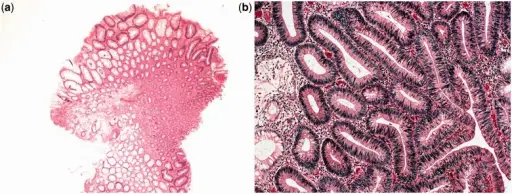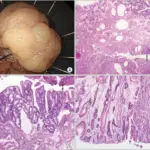Neoplastic polyps include adenomas and serrated types. These polyps have the potential to become cancer if given enough time to grow. Most of these colon polyps are called adenomas. Serrated polyps may also become cancerous, depending on their size and location in the colon.
What is the Pathology of Neoplastic Polyps?
The pathology of neoplastic polyps is:
-Etiology: The cause of neoplastic polyps is smoking and excess alcohol use, obesity, lack of exercise and fat intake, race.
-Genes involved: None.
-Pathogenesis: the sequence of events that lead to neoplastic polyps are hyperplastic epithelial foci and small hyperplastic polyps with juvenile polyps with focal adenomatous epithelium.
-Histology: The histology associated with neoplastic polyps shows tubular, tubulovillous, or villous based on the glandular architecture.
How does Neoplastic Polyps Present?
Patients with neoplastic polyps typically more in men at age of 50 or older. The symptoms, features, and clinical findings associated with neoplastic polyps include: mixture of normal, ulcerated, and regenerating mucosa which is surrounded by areas of mucosal loss.
How is Neoplastic Polyps Diagnosed?
Neoplastic polyps is diagnosed by virtual colonoscopy, CT colonography, stool-based tests, flexible sigmoidoscopy, and biopsy.
How is Neoplastic Polyps Treated?
Neoplastic polyps is treated by removal with forceps or a wire loop polypectomy, surgery.
What is the Prognosis of Neoplastic Polyps?
The prognosis of neoplastic polyps is poor.



